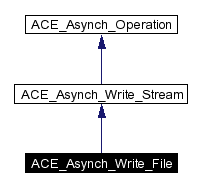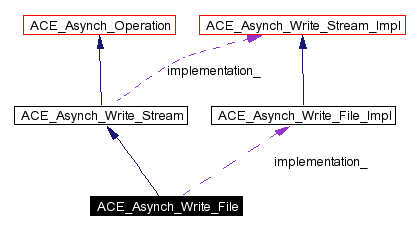
#include <Asynch_IO.h>
Inheritance diagram for ACE_Asynch_Write_File:


Public Methods | |
| ACE_Asynch_Write_File (void) | |
| A do nothing constructor. | |
| virtual | ~ACE_Asynch_Write_File (void) |
| Destructor. | |
| int | open (ACE_Handler &handler, ACE_HANDLE handle=ACE_INVALID_HANDLE, const void *completion_key=0, ACE_Proactor *proactor=0) |
| int | write (ACE_Message_Block &message_block, size_t bytes_to_write, u_long offset=0, u_long offset_high=0, const void *act=0, int priority=0, int signal_number=ACE_SIGRTMIN) |
| int | writev (ACE_Message_Block &message_block, size_t bytes_to_write, u_long offset=0, u_long offset_high=0, const void *act=0, int priority=0, int signal_number=ACE_SIGRTMIN) |
| ACE_Asynch_Write_File_Impl * | implementation (void) const |
| Return the underlying implementation class. | |
Protected Methods | |
| void | implementation (ACE_Asynch_Write_File_Impl *implementation) |
| Set the implementation. | |
Protected Attributes | |
| ACE_Asynch_Write_File_Impl * | implementation_ |
| Implementation object. | |
Once <open> is called, multiple asynchronous <write>s can be started using this class. A ACE_Asynch_Write_File::Result will be passed back to the <handler> when the asynchronous writes completes through the <ACE_Handler::handle_write_file> callback. This class differs slightly from ACE_Asynch_Write_Stream as it allows the user to specify an offset for the write.
|
|
A do nothing constructor.
|
|
|
Destructor.
|
|
|
Set the implementation.
|
|
|
Return the underlying implementation class.
Reimplemented from ACE_Asynch_Write_Stream. |
|
||||||||||||||||||||
|
Initializes the factory with information which will be used with each asynchronous call. If (<handle> == ACE_INVALID_HANDLE), <ACE_Handler::handle> will be called on the <handler> to get the correct handle. Reimplemented from ACE_Asynch_Write_Stream. |
|
||||||||||||||||||||||||||||||||
|
This starts off an asynchronous write. Upto <bytes_to_write> will be written from the <message_block>, starting at the block's <rd_ptr>. The write will go to the file, starting <offset> bytes from the beginning of the file. Priority of the operation is specified by <priority>. On POSIX4-Unix, this is supported. Works like <nice> in Unix. Negative values are not allowed. 0 means priority of the operation same as the process priority. 1 means priority of the operation is one less than process. And so forth. On Win32, this is a no-op. <signal_number> is the POSIX4 real-time signal number to be used for the operation. <signal_number> ranges from ACE_SIGRTMIN to ACE_SIGRTMAX. This argument is a no-op on non-POSIX4 systems. |
|
||||||||||||||||||||||||||||||||
|
Same as above but with gather support, through chaining of composite message blocks using the continuation field. NOTE: In win32 Each data block payload must be at least the size of a system memory page and must be aligned on a system memory page size boundary |
|
|
Implementation object.
Reimplemented from ACE_Asynch_Write_Stream. |
 1.2.18
1.2.18